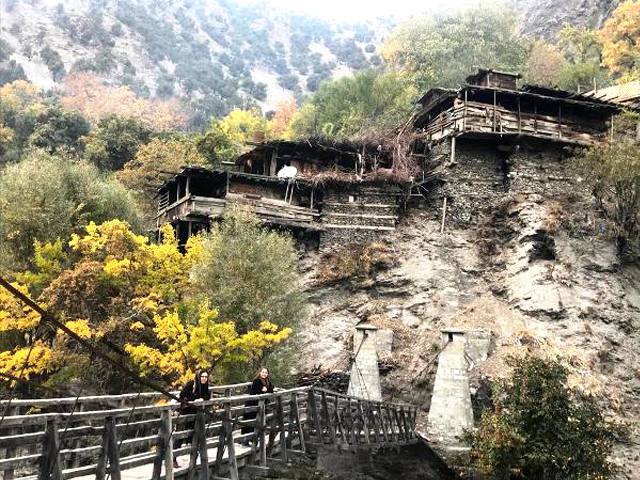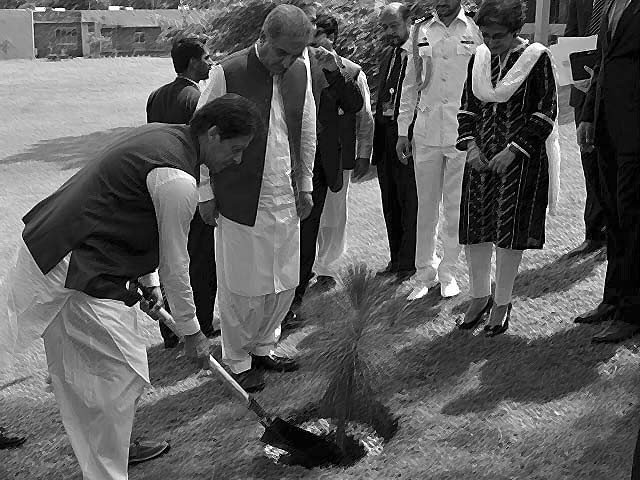
The Kalash are trying to hold onto their unique culture and language. PHOTO: RINA SAEED KHAN
Declared ‘intangible’, the heritage of Kalash is over 3,000 years old – but will it survive the 21st century?
The Kalash are trying to hold onto their unique culture and language, while battling poverty and climate change.
'Ishpata Inn and Restaurant', says the sign to a roadside hotel in Bumburet Valley in the Chitral district. Ishpata means welcome in the Kalasha language spoken exclusively by the endangered Kalash people, an ethnic group that has lived in three secluded valleys of these towering mountains for centuries: Bumburet, Rumbur and Birir.
There are only around 4,000 Kalash villagers left in Chitral. They are one of the last peoples of western Asia to retain their aboriginal culture and have survived many waves of invaders, refusing to convert to Islam. Their neighbours across the mountains in the north-western region of Afghanistan, which Muslims called Kafiristan or the Land of Pagans, were all forcibly converted to Islam in 1895 by the Afghan King Abdur Rahman Khan, who also destroyed their temples and icons.
On the Pakistan side, the Kalash were only spared from this mayhem as they were protected by the Mehtar (royal ruler of Chitral) and his overlords, the British colonial rulers of that era. The Kalash have since lived under steady pressure to convert to Islam. Their culture has recently been included by the United Nations Educational, Scientific and Cultural Organisation (UNESCO) in its list of Intangible Cultural Heritage. Today, the Chitral district is part of Khyber Pukhtunkwa (K-P), and the Kalash are trying to hold onto their unique culture and language, surrounded by the highly conservative society of K-P and with the added pressures of poverty, unchecked tourism to their valleys and the threat of climate change.
In 2015, the Bumburet Valley was devastated by flooding caused by unprecedented rainfall. Even today, one can see the large boulders that were swept down by the floods, while many of the buildings near the stream running through the valley are still in ruins. The road through Bumburet is barely a jeep track, passing through fields lined with walnut trees and inexpensive hotels like Ishpata Inn.
The Kalash Cultural Centre is located in the middle of Bumburet and was spared by the floods, thanks to its thick walls. This centre, a contemporary building constructed in the traditional stone and wood architecture of the area, is attempting to revive Kalash culture and language and houses a museum and a school, the only one in the area that teaches the Kalasha language.
 The Kalash cultural centre
The Kalash cultural centreIn the Kalasha language, which is a pivotal part of Kalasha culture, there are no names for the days of the week or for the months of the year. They live in harmony with nature and celebrate the changing seasons, with the main festivals taking place according to the seasons. In spring, there is the Zhoshi festival (May), in summer the Uc’aw (August) and in winter the Chawmos (December), which is the largest and most religious one. During these festivities, songs are sung and folktales narrated in their native language, along with dancing and the drinking of locally brewed wine.
“The Kalasha language is what we all speak at home,” says Mohammed Iqbal from the Kalash village of Rumbur, who has worked with different organisations in these valleys to preserve the local culture. “But we are losing our language. There have been so many conversions to Islam and once people convert they don’t teach their children Kalasha.”
The origin of the Kalasha and their language remains a mystery. Two major lines of research suggest that the Kalasha are either descendants of the Vedic Indo-Aryans, which dates them back to around 1,400 BC, or they are descendants of the armies of Alexander the Great, which would trace their existence as a distinct group to third century BC.
The cultural centre mentioned earlier was constructed by Greek volunteers in 2004, and houses a museum and the Private Institute of Kalasha Culture and Traditions. The Government of Greece recognised the Kalasha to be the descendants of Alexander the Great’s army when he marched through this region centuries ago, and thus have actively given both financial and technical support to the Kalash people over the years.
 Inside the Kalash museum
Inside the Kalash museum“Unfortunately, due to the economic crisis in Greece, this support has dried up,” says Akram Hussain, the assistant research officer at the cultural centre.
 Akram Hussain, Assistant Researcher at the Kalash Cultural Centre
Akram Hussain, Assistant Researcher at the Kalash Cultural CentreThe Kalasha have also been threatened by the Taliban in the past. Their neighbours across the high mountain passes in the Afghan province of Nuristan are the Afghan Taliban. In 2016, armed militants from Nuristan attacked shepherds in the Birir Valley in three separate incidents, killing two Kalash shepherds and stealing their livestock. The Pakistan Army has now moved into the valleys to provide them with better security, with soldiers patrolling the valleys and police check posts being set up where ID cards are checked.
“We have heard that the Army is now moving out and handing security back to the local police. I wish they would stay to protect us. If our livestock goes, our culture goes,” explains Hussain.
 On the way to Birir in our trusty Willys jeep
On the way to Birir in our trusty Willys jeep The picturesque Kalash settlement of the Birir Valley
The picturesque Kalash settlement of the Birir ValleyThe Kalash believe in a creator called Dezau, but also believe in various deities, semi-gods and spirits. Prayers are usually offered during their festivities, and their elaborate rites demand the sacrifice of dozens of goats. They also survive on their milk, goat’s cheese and butter supply during the long winter months when their valleys are cut off from the outside world due to heavy snowfall. In 2015, Bumburet and Rumbur were also badly damaged by flash floods and glacial floods that poured down the steep mountainsides when unprecedented rainfall hit Chitral.
Climate change is clearly taking its toll on them – the main problem this past summer was a lack of rainfall and many springs have gone dry in recent months.
The Kalasha have also been facing other problems, as migrants move into their valleys and settle down to farm the land or run hotels and shops.
“Some of these migrants are brainwashing the Kalash people. Some even marry the Kalash women and make them convert to Islam. There have been several conversions to Islam in Birir where the Kalash are surrounded by Muslim neighbours”, says Hussain. “Once a Kalash man or woman converts, he or she can no longer participate in our festivals and ceremonies. They cannot be a part of our community, although they can come back and visit their families.”
The conversions have stopped recently, as education spreads amongst the Kalasha and they have started taking pride in their ancient culture.
“I love to dance at our festivals, and Kalasha women have so much freedom,” says Shahira, a Kalash woman from the nearby Krakal village in Bumburet.
 Old Kalash woman in the Krakal Village
Old Kalash woman in the Krakal VillageWomen of Kalash culture are free to marry whomever they want and are equally free to leave their husbands for a new suitor after paying a certain fee, which either the new husband or the woman’s father pays.
“I haven’t found a suitable man as yet, but when I do find a good boyfriend, I will marry him,” Shahira says.
 Shahira in her house in the Krakal Village
Shahira in her house in the Krakal Village Shahira with a friend
Shahira with a friendRecently, two other confident young women, Ariana and Amrina, have become famous for singing their local Kalasha love song called Pareek on Coke Studio. Pareek means ‘let’s go’ in Kalasha, and it is about a lover asking his beloved to go with him to the high mountain passes and alpine pastures. The song became an instant hit across Pakistan and helped further promote Kalasha culture, especially as the two women were filmed wearing their traditional, colourful dresses and singing in the Kalasha language in their native village in Bumburet.
 Ariana and Amrina in Bumburet Valley
Ariana and Amrina in Bumburet Valley“It has made us all very proud,” explains Quaid-e-Azam, a Kalash man from Rumbur who is the manager of an upmarket hotel called Hindu Kush Heights in Chitral town. “Our young people are better educated than us and they are now realising the importance of our unique culture. If we can get more scholarships at universities in Chitral and Peshawar, our youth will excel further. You know, so many of our families have realised the importance of education to the extent that they are even selling off their livestock so the children can go to school.”
There are now low-cost government schools (primary and high schools) in all three Kalash valleys, and one hopes this will play a role in preserving their historic culture. The rich heritage of the Kalash is over 3,000 years old, and we can only hope it survives well into the 21st century.
All photos: Rina Saeed Khan




COMMENTS (6)
Comments are moderated and generally will be posted if they are on-topic and not abusive.
For more information, please see our Comments FAQ